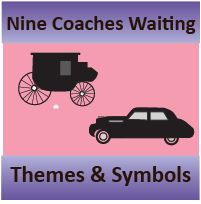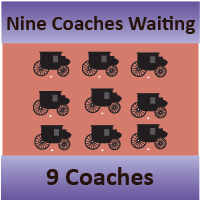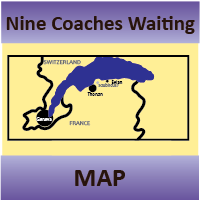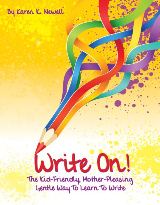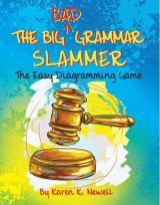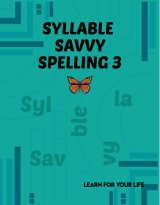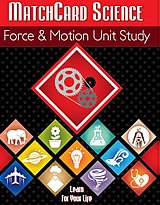Nine Coaches Waiting
Analysis on Mary Stuart's Gothic mystery, Nine Coaches Waiting.
For the lovers of Gothic romance, mystery, and all things Bronte, here's another book to add to your reading list. Nine Coaches Waiting is a dramatic tale weaving suspense-and-mystery with a Cinderella-like romance in a setting where the nineteenth and twentieth centuries mingle at the edges.Published in 1958, Nine Coaches Waiting continues to be read by young adults and adults.

Summary
Linda Martin travels to France to become the governess of young Philippe de Valmy. Eager for a new start in life, she hides her French background in order to obtain the job specifically for an English governess. While disguising her identity, she wonders what else is hidden at the Chateau Valmy.Objectionable Content?
By today's standards this book is pretty clean. Nonetheless three objections could be raised for young readers:- Attempted murder (Well, it IS a mystery so what should you expect?)
- Sprinkling of the four letter word "D**n"
- The heroine agrees to marry Prince Charming after knowing him about ten days. Yeah, all things considered, it's the biggest problem and possibly missed by indiscrimate young readers.
Classic Literature
By one of the simplest definitions of classic literature (in continuous print for 50 years and widely available) Mary Stuart's novel has made the grade. But if we do a deeper analysis, will it pass? Read further to find out.SPOILER ALERT
This page provides an analysis of the plot and openly discusses it. So if you don't want to know "who done it," don't read any further. (But if you're eager to hear whether it makes the classic-lit-club without having the beans spilled on the plot; read at the bottom of the page below the nine-coach-diagram which is beneath this line of print.)

Genre and Setting of Nine Coaches Waiting
Gothic literature is known for its ominous tone, dark and eerie setting, and often an ill-fated romance woven into the main mystery.
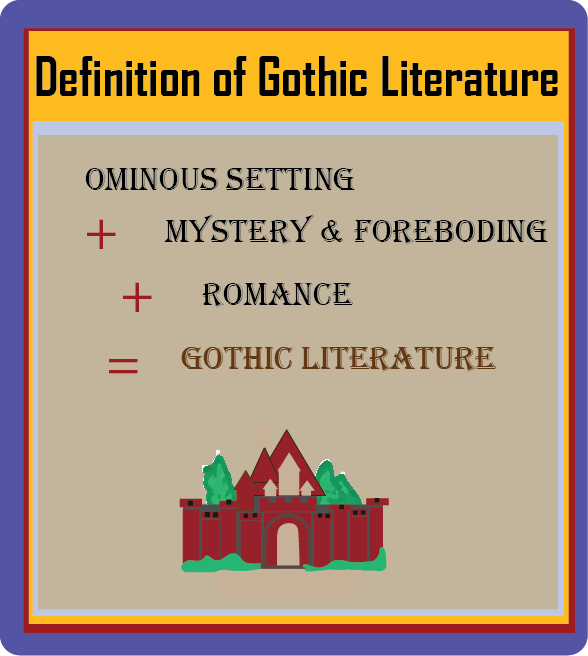
But make no mistake, the gloom is there. From her initial encounter with Leon de Valmy, as his wheelchair emerges from the shadows, a perceptible cloud covers her horizon. It is NOT the Chateau itself, but its inhabitants that create the foreboding.
Setting
The story takes place in the late 1940's, post World War II, in rural France about 20 miles from Geneva.It is the estate of late Comte de Valmy. Wealth and intrigue, a luxurious ballroom dance, servants quarters and a nursery fill the pages along with cars, planes, and telephones. Here the last vistages of the eighteenth century reached well into the nineteenth as the Valmy family tries to maintain their hereditary estates and social-esteem.
See the map of France and Valmy estates. It also includes a list of estates owned and inhabited by which heirs.
Action Plot Analysis of Nine Coaches Waiting
Exposition
Setting, Characters, Dilemma
I'm sure we all remember the classic definition of exposition: that early part of a story where the reader encounters the setting, characters, and dilemma.Our author deviates from the usual pattern. The story is written around a literary device of coaches (or car rides.) Click here to identify the nine coaches and how each affect Linda's future.
In the first chapter (with the first two coaches), Linda reflected on the past when she lived in Paris with her English father and French mother until their death sent her to a London orphanage ten years ago. With no career opportunity before her, she accepted the position of an English governess (it must be an English governess!) as a way to return to her native France.
Recognizing that Paris is no longer her home, she squared her shoulders to meet her future. But strangely, she has a vague memory of a conversation between her parents about Leon de Valmy. He was charming and attractive to women (apparently including her mother) but her father hated him. We the readers are warned!
In chapter two (the third coach) she rode with Heloise de Varney, "elegant and remote with that chilly grace." Up-front sat two sullen servants: Bernard and Albertine. On arrival Linda meets the friendly, gossipy housekeeper and finally we are introduced to her new charge, the quiet and formal young Philippe who wins the reader's sympathy.
So much for the exposition.
But wait! Did you miss something? An exposition includes the dilemma: the problem that holds the entire narrative together and fits one of the categories of person vs person, person vs nature, person vs self, etc.
For the next eleven chapters we enter that phase we call Rising Action (and it will rise) but we don't exactly have a problem. Secretly speaking French isn't exactly a spine-tingling dilemma.
It isn't until chapter 13 (out of 21 chapters) we get to the real problem. The family is planning to murder young Philippe to seize his estate. And they will probably frame her for it.
Yep! That's a problem. (And I did warn you that I wasn't trying to hide the plot, didn't I?)
So what's my point? Mary Stuart manages to hold our attention and climb that intensifying hill within a story we call Rising Action, before we even know what the dilemma is. In case you didn't catch that, you ought to silently thank Mary for her crafty craftmanship.
Rising Action
So how does Nine Coaches Waiting keep the reader turning the pages before the heart-skipping problem is revealed?It's the character of Leon de Valmy and his sometimes-warm; sometimes-cold wife, Heloise, that does it. Linda internally used the expression fallen angel and Demon King to refer to him. I've had a few bosses I didn't care much for but I never called them Demon King. But Leon is truly a complex character and NOT the picture of evil. Suave, handsome, somewhat charming, he is popular with his servants and tenants in the village. Nonetheless, Linda is keenly aware of the cat-and-mouse game and power-play in his presence, though she can't put her finger on it exactly. But when he first meets Linda he tells his wife in French (which Linda supposedly doesn't understand), "It is possible you've made a very great mistake." We just know something is up. (Answer: He recognizes that the "gallant little devil" isn't afraid of him and might have more backbone than the kind of unattached-English-orphan they sought.)
It's not that there is no rising action in those early chapters. There is. Some highlights include:
- She observes Leon's cruelty to Philippe when her presence was unknown.
- A mix up with pills and prescriptions
- Meets an English forester, William Blake in town
- The famous-but-kind fashion designer Monsieur Florimond visits (more cat-and-mouse between Leon and Philippe and then Leon and Linda)
- She is almost struck by Raoul's car (Leon's son) when he arrives at the Chateau for a visit.
- On a walk with her through the woods, Philippe is almost shot by an unknown person.
- She is given a night off and Raoul takes her out to eat and dance.
- She falls in love with Raoul. Oh, how predictable. She is head-over-heels over her employer's attractive, popular, and rumor-ridden son.
- She is expected to go to the Easter Ball. She makes her own gown with the help of Berthe, the maid who cleans the nursery.
- Raoul is jealous when he sees her wave to the English forester. He kisses her roughly in the car.
- Philippe has a second accident when the balustrade falls from the balcony. Linda's foresight in putting the step-ladder across saves his life.
- Albertine sees Raoul kiss Linda the night before the ball. A rumor is spread through the Chateau and the village that Linda will be dismissed. She is ostracized by all.
- At the ball, Monsieur Florimond seeks her out. He knows something. He verifies that she is alone without family or resources and offers his help if she ever needs it. He warns against Raoul.
- Raoul dances with her at the ball and takes her aside. He proposes and she is over-joyed.
- Raoul tells her he will inform his father of their engagement the next day since Linda is intimidated by him.
- Philippe, Linda, and Raoul share a secret-midnight dinner after the proposal which is interrupted by Heloise.
- She gets a note the next morning (Tuesday) that Raoul had to leave on urgent business but will be back on Thursday.
Now comes the most exciting part of the story as Linda flees with the heir, meanwhile vacillating between believing Raoul is innocent or guilty. For six chapters Philippe and Linda hide and re-emerge, hoping to get to Uncle Hippolyte before they are caught.
Their flight takes them to William Blake's cabin which is empty, they are cornered by Bernard and escape... breakfast in a cave... a nap in the woods... dinner at a cafe... phone calls and suspicions as the two travel to the villa of Philippe's Uncle Hippolyte. Step-by-painful step both Linda and the reader have to conclude that Raoul, who is now hunting them with Bernard, is guilty and only proposed in order to pin the murder on her.
The Climax
After 24 hours of flight and 48 hours without sleep, Linda and Philippe hide in Hippolyte's house waiting for his arrival. As he comes in late at night Linda approaches him.Too late.
It is Raoul who steps into the light. "So, you are here," he said. As he dashes up the stairs she comes between them and shrieks, "Run, Philippe."
As the pain, then cold anger register on Raoul's face, Linda recognizes he HAD been their ally. "And now I saw the look that came down over his face, bleak bitter pride shutting down over anger, and I knew that I had turned my world back to cinders, sunk my lovely ship with my own stupid, wicked hands. I couldn't speak, but I began to cry."
Before we head into the denouement and find whatever explanation can turn the obviously-guilty Raoul into the nobly-not-guilty-but-misunderstood Raoul, let's look at our author's technique to accomplish this feat.
In most stories - and mysteries in particular - there are two timelines.
- The timeline in which the main character (and hence the reader) experience the events.
- The true timeline in which things actually happened.
In Nine Coaches Waiting we have no less than four denouements, accomplished by three different narrators reporting their side of the story. And just to keep readers staying up late into the evening reading when they should have stuck their bookmarker in between chapters and called it a night, the drama continues between these narratives.
Denouement #1: Raoul Speaks
As Hippolyte and Heloise arrive at the Mireille Villa, Raoul explains the drama from his perspective. He began to get suspicious from Linda's report, cabled Hippolyte to come home immediately, had to keep a business appointment in Paris but came back a day early due to his anxiety. Finding Linda and Philippe gone, he confronted his father who tried to get Raoul to join him in the plot. He refused, threatened to kill his father if any harm came to Linda or Philippe, and made Bernard understand he will be in trouble if they aren't found. The rest of the day the two searched for them together.Denouement #2: Heloise Speaks
Trapped by Raoul's accusations and Leon's confession, Heloise breaks down and gives her version of the events. They planned to dismiss Linda after she saved Philippe from the balcony fall because she might become suspicious. But her romance with Raoul gave them a new opportunity. Linda would bear suspicion for conniving to become the new mistress of Chateau Valmy by marriage to Raoul. They then changed their plan to poison Philippe with the prescription pills.Denouement #3: William fills in the rest
When Raoul infers that his father had ordered Bernard to find (and perhaps kill) Linda and Philippe after they fled, he dashes out of Mireille Villa to return to the Chateau. Linda, now joined by her friend, William, pursues him afraid he will keep his threat to kill Leon. Finding Leon dead when she arrives, she swoons.It is, surprisingly, William who tells the rest of the story to Linda. Threatened with blackmail by Bernard, Leon killed himself after leaving a note implicating only Bernard. Bernard has fled; Heloise's health is irrevocably destroyed and Raoul and Hippolyte plan to put her in a nursing home with a small pension.
Final Denouement
Hearing Raoul's car leave - apparently the last she will see him - she cuts across the zigzag and (again) almost gets hit by his car. She explains she fought to believe he was innocent, but everything pointed to the opposite and she had to protect Philippe. Raoul, it turns out, was on his way back to Mireille Villa to find her.A happily-ever-after, Cinderella-type ending?
Maybe. But not exactly. Raoul, she discovers, is not the dashing bachelor she thought him to be. Like her, he is alone, having lived in the shadow of his egotistical father.
Deep Dive on Raoul: Guilty vs Innocent
One of the best literary phenomena of this narrative is the agonizing descent down the abyss that the reader experiences with Linda as she "discovers" that Raoul is guilty.From the first moment she hears Berthe tell her Raoul is on it, she struggles to find a way to maintain his innocence. But finding him in his Cadillac when he said he was in Paris, watching him consort with Bernard who comes very close to their hiding place, and watching them drive off together leave no wiggle-room for denial. The "facts" as she is forced to confront them are:
- Raoul plans to murder the child I care for. (Big ouch.)
- Raoul faked a love-affair with me as part of the plot. (Strike two.)
- They are going to frame me for it. (Real ugly)
- I was fool enough to fall for it. (Total gut punch.)
Well, no. It gets worse.
He is mad and in hot pursuit. Having finally made their way to Mireille Villa he is right behind her, turning on light-after-light in his search of the Villa while she and Philippe crouch in the shadows behind a fountain. Then Bernard drives up. She over-hears the angry conversation that she had just made a call to William half an hour ago. These guys are onto her every move. Yes, her clever ploy did buy her some time as they speed off to the hotel in Evian (about 15 minutes each way) but they are close. Too close. And pretty dangerous. Just what will they do when they catch the two of them, now that their cover is blown?
So how do we go from total guilt to total innocence?
Of course, she recognized it in his eyes and his voice as he says, "I see," after she screamed to Philippe to run. But we don't get to see that look so aren't so readily convinced.
Hippolyte to the rescue. As he wearily opens the conversation in the salon, he states to Raoul:
You rang me up in Athens in the small hours of Tuesday morning to ask me to come as you were anxious about Philippe. You spoke of accidents and insisted that Philippe might be in some danger. You also said something about Philippe's governess...."
Well, that's good. Raoul, it turns out, is the one who called the trusted Hippolyte to come home because he recognized the danger before Linda did. He wouldn't have called Hippolyte to come if he was involved in the plot.But Raoul responds:
"You can forget Philippe's governess." He hadn't even glanced at me.
More pain. He's done with her.Raoul's innocence is further revealed by Heloise who admits to the plot, pitifully begs for help, and then screams at Raoul for not helping them.
The only evidence left against him is Bernard's testimony. Linda assumes he blamed Raoul because even drunk he knew Berthe might shun him if he had shot the child. While not explictly mentioned, we can also infer that if the athletic Raoul was involved in the plot, the wheel-chair-bound Leon wouldn't have needed the help of Bernard at all.
Assessment of the Action Plot
The author used and modified the main parts of the typical fiction action plot to weave a story that keeps readers engaged. For sixty plus years!That's no small task and thus this story does earn the classic romance title from that feat alone.
But a stronger element of classic literature is character development. How does the story fair in that analysis?
Character Analysis in Nine Coaches Waiting
Linda
Half French and half English, we know up-front she is an orphan without friends, family or home. But, reading between the lines, she is not from a poor family. He father was a successful writer, who taught her poetry, and was having one of his stories turned into a movie at the time of his death. Her parents died in a plane accident in an era when air travel was affordable primarily for the upper class. We learn in her early flashback that they knew Leon de Valmy (but we never learn how.) And she states that the wealthy Monsieur Florimond reminds her of her father. Interestingly, while French vs English is one of the themes of the book and Linda identifies with her French-self, more than her British-self, it is her English father she refers to more often than her French mother.The author hides another telling-trait about Linda until half way through the story: she is beautiful. When Raoul kissed her before the dance and she asks him: "You could have anyone....so, why?" He answered by turning her around to the mirror and telling her not to be so humble. She overheard gossipers call her "that pretty little thing."
Beauty IS rather helpful if you are a Jane Eyre.
Character Development of Linda
Linda's moment of change came not at the end - as literary law usually dictates - but at the beginning. She realized between the two taxi cabs (Coach #1, Coach #2) that arriving in France will not bring back her old life. She needed to seize life by the horns, and she chose to do so.But her moment with destiny is when Berthe revealed that Bernard and Raoul are in on the murder plot. She empathized with Berthe who is in the same predictament. But Linda never considered preserving her job which is the main concern of Berthe who protests she will deny it all if Linda goes to the police. Although Linda's intergrity far outshines Berthe's, the housemaid deserves credit for taking the risk to warn Linda of her danger.
But while Linda never wavered in her commitment to Philippe, her love for Raoul and cold reason were at war with each other. She made an uncommonly sane decision:
Philippe was what mattered. All the rest could be sorted out, pondered, mourned over, later; now the urgent need was to think about Philippe.
She stated to Berthe:"Well, look Berthe. We've got to be tough about this for Philippe's sake, and because there isn't much time. Later on we can work it out and - and decide who's guilty and who isn't. At present I suppose we must assume they're all in it, whether or not we can believe it in our heart of hearts."
I give Linda five stars for being smart, gutsy, and independent.It just bugs me she thought she had to apologize for it at the end!
Leon de Valmy: The Lion
We have already touched on this character, the hidden-in-plain-sight antagonist whose power-plays pervade the Chateau.Throughout the story I was waiting for the first-chapter-flashback conversation of Linda's parents to come to fruition by revealing how the families knew each other. But it didn't happen. We are just left with her father's words, "Why should I be a hypocrite? You know I detest the man."
While superficially friendly and popular, his ego is evident. He has a larger-than-life painting of himself hanging in his library. He seems to be almost omniscient:
- Linda suspected he already knew she spoke French. (And he would have, since she yelled in French after Philippe was shot at.)
- She suspected he knew about their fight and kiss when she stormed from Raoul's car to her room.
While appearing to be omnipotent, he is not. Raoul does not fear him - at least not much - and is willing to confront him.
The tragic part of Leon's story is that he created the unnecessary drama that destroyed himself. Had he simply been a kind, supportive guardian of his nephew, it is highly probable Philippe as a young adult would have kept his uncle on at Valmy while he returned to Paris.
William Blake: The Lamb
Friendly, trustworthy, and clumsy - we will not examine William's character as much as his role in the story.He is obviously attracted to Linda - he asks her every time he sees her if they can meet again. And she always says, "Uh, well, I don't really think my schedule will allow it."
He IS potential competition; except that Linda isn't interested.
If Leon is the tiger, William is the lamb. (See other literary references in Nine Coaches Waiting.
While not a serious threat to Raoul's engagement, he did have a few roles: she fled to him, was almost captured by Bernard in his cabin, ran to him when he rushed willingly to her side as Raoul ignored her during the denouement. Strangely, William is the one to give her the details of the suicide. It is William - and not Raoul - who took care of her after she swooned in the library by Leon's corpse.
Raoul: The Wolf
Raoul's name means wolf - a detail that doesn't come out in the story but fits the character.Linda sees him, like his father, as a tiger. Strong, dynamic, unpredictable.
Irresistibly handsome helps, too.
As a keyboard psychologist, I have to say the wolf-label is better. This guy has some real anger issues.
Frightened by the fact that he almost ran over an unknown woman, he yelled at her - anger his automatic response to fright. He became jealous because she waved to William in town. His first unwelcome kiss was so rough it cut her lip.
Twice he came close enough to the fleeing pair to be overheard by them - and both times he was angry instead of worried. His responses in the denouement exude ire and resentment - at both Linda and Heloise.
Mad at Linda? He should have been beside himself thanking her and relieved she was safe.
Let's get this straight. You met the vulnerable governess on a Saturday, take her on a date the next night, then proposed to her on Monday night nine days after the first encounter. She fled Tuesday night and has been 24 hours on the run from your father who has involved her in a murder plot. And YOU are mad at HER? She needs to apologize to YOU?
Maybe my own anger issues are showing here but he has ZERO reason to get mad at her. Repeat: YOUR own father involved her in a murder plot and you demand someone who has known you ten days to believe in your innocence?
So, he really isn't such a Prince Charming. At least in my book.
But, before we trash him completely, he does have some good qualities that deserve a hearing.
First he was kind to young Philippe, winning his loyalty and trust. Kids have a sixth sense.
He was never even slightly tempted to murder the child, even when his father tried to cut him in. It was a non-factor. We ought to say that not wanting to kill a kid should be the minimum-bar for potential husbands, but he passed that with flying colors; at least once the whole story came out.
And he gets high points for honesty. He told her the truth that he had a history of using women. He didn't know what love was and couldn't tell if he was in love with her or not. (Quite the proposal, really, but at least he was honest.) Of course he does figure out he's in love with her eventually - two more days being eventually - but still gets mad because she doubted him.
We should mention his spirited, fun-loving, humorous, and hard-working nature. Good qualities for a husband. Add the good looks and the fact that he's rich.
I'd say its a mixed bag.
But. At least. he's not. a killer.
Humor in Nine Coaches Waiting
This story is largely devoid of humor, but two scenes are worth describing. Both involve William Blake.First, when Linda calls him while hiding out in the Mireille Villa she pretends to be a loose woman to disguise her identity from her pursuers. The Frenchman at the bar is listening to his conversation and she instructs him to say good-bye in French as you would to a paramour. He massacres the French words.
The second is even funnier and provides comic relief from the tense drama as Hippolyte questions Raoul and Heloise. As explanations come to an end, chapter 19 closes with William "rushing in like an angry bear."
"Who the devil are you? said Raoul."
Then Linda runs all the way down the long room to William.
He didn't exactly fold me in his arms, but he did catch me, and with some presence of mind, hold me away from him so that the bouillon didn't spill all over his ancient jacket, but only on the priceless Savonnerie carpet.
The goofy bowl of bouillon remains in his hands as the drama continues and they all go rushing out (albeit in a mix-up of cars.)
Writing Style
Two quotes to demonstrate the descriptive writing style:
Shops had spilled their goods onto the pavements; racks of brightly printed dresses swung in the warm breeze; red and green peppers shone glossy among last seasons withered apples...
Soup first, the first delicious hot mouthful in almost twenty-four hours...It was creme d'asperge, and it came smoking hot in brown earthenware bowls with handles like gnomes' ears, and asparagus tips bobbed and steamed on the creamy surface.
Final Assessment
Is Nine Coaches Waiting Classic Literature?
As stated above, the book easily makes the grade for over fifty years in continous print. In addition, it has a wide fan base.From a more academic perspective, it's a little harder to verify it's ascent into that nebulous zone known as "a classic."
Character development? It is there, but not as strong as we usually see with classic literature.
Strong use of literary elements? The author does employ a few unique and effective strategies through the action plot as described above which earns some points.
Create a new genre or influence other books? Mary Stuart has earned a place in modern romance; but generally romance itself doesn't earn the classic title. (Though certainly many classics have romance; Romeo and Juliet as the first to come to mind.)
Development of new themes or new exploration of old? Not the strongest point, though I think the French vs English theme has considerable merit.
Where I give the book the highest mark is convincing the reader that the antagonist's beloved is a guilty rat. Apparently Mary Stuart herself struggled with keeping him a villain or returning him to Prince Charming status. She clears him fairly cleverly, but then takes us down a new path of grief for his apparent rejection of Linda. Nice touch, from a literary perspective.
The final redemption is, perhaps, a little too Cinderella-like. If Linda chose William instead of Raoul it wouldn't be satisfying. In truth, William WAS perhaps the better man, but there was no "there" there.
If Raoul drove away, never to be seen again, it would leave Linda where she started - which was nowhere.
So given the options, while it turned out the best in order to satisfy the expectations of a romance, it didn't soar to heights unknown. But then, every once in a while, it doesn't hurt to have a happily-ever-after ending. Just because.

Almost!
Disclaimer #1: I am not willing to die for that assessment, so anyone wishing to grant full-literary classic status to this book may do so without any fear of combat from these quarters.
Disclaimer #2: If you are looking for a clean romance/mystery that keeps you reading until the last page - well, here's one for your list.
Nine Coaches Waiting
Get the low-down, deep-dive, in-the-know analysis of Mary Stuart's Gothic novel.
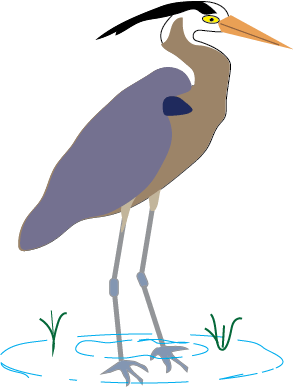
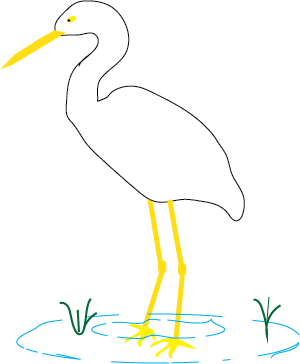
About Our Site
Hands-On Learning



